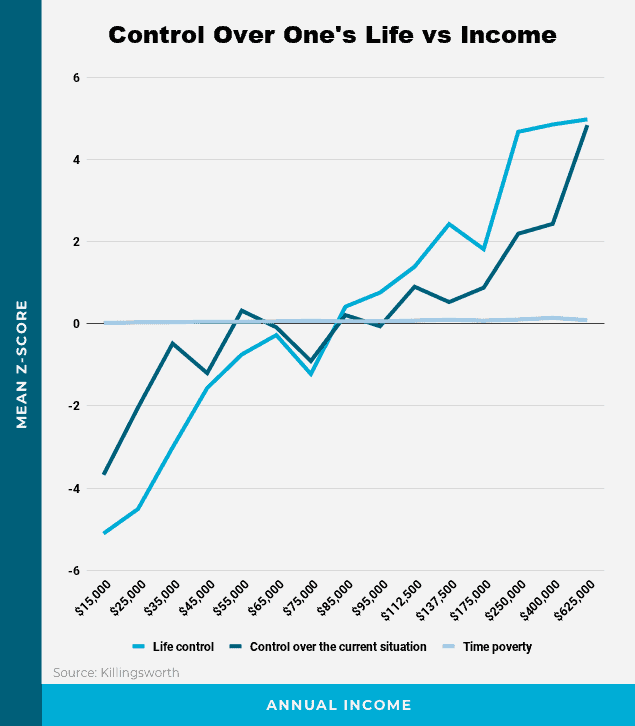In a well known study from 2010, it was found that the magic amount of money you needed to earn each year to be happy was $75,000.
As the Nobel Prize-winning economists who conducted that study observed – along with the thousands of articles that have cited this figure since then – the further your salary falls below this amount, the unhappier you’ll feel. But when you start to make more than this, your happiness doesn’t actually continue to increase.
These results were great for those of us who aren’t millionaires. After all, money doesn’t buy happiness – right? Surely all those extra millions of dollars that the 0.001% has doesn’t make their lives any better?
Well, a new study actually confirms the exact opposite. That is, it’s found that the more you earn, the happier you’ll likely be.
Summary of findings
Based on 1,725,994 samples of 33,391 employed adults in the US, Matthew Killingsworth’s study titled “Experienced well-being rises with income, even above $75,000 per year” has found that:
- There’s no evidence that happiness plateaus once people earn more than $75,000 a year
- In fact, people’s happiness continues to go up as their earnings increase
- Similarly, those with higher incomes have lower levels of negative feelings
- People with higher incomes are happier both moment-to-moment and with life overall
Let’s look into this a bit more below.
There’s no evidence that happiness plateaus once people earn more than $75,000 a year
The earlier $75,000 study found that people’s positive feelings tend to plateau once their annual earnings hit that amount. This study, however, had a very different outcome:

This chart shows the combined average of each income group’s responses to the question of whether they were experiencing various positive or negative feelings at that moment.
If the findings in the earlier study also occurred here, then you’d expect the line showing positive feelings in this graph to flatten out after hitting $75,000 (and there’s a good argument to be made that the same should happen for negative feelings). However, as you can see, this is definitely not the case.
In fact, the positive results actually increase sharply with no sign of a plateau once annual income gets to $75,000. Similarly, the negative feelings decrease fairly dramatically after that point.
These findings show no indication at all that earning more than this has no effect on your experienced well-being. In fact, it suggests that it’s exactly the opposite – that money actually can and does buy happiness.
People’s happiness continues to go up as their earnings increase
We can further break down the question of whether people’s positive feelings stop going up after their annual earnings reach a certain amount, by seeing just how people experience specific feelings at different income levels.

It’s obvious from these results that there’s a clear upward trend that continues well past the $75,000 point. That is, in almost all of the responses, participants reported feeling more and more confident, good, inspired, interested and proud as their incomes went up.
One thing worth mentioning is that there’s an interesting dip for those who reported feeling less inspired in the highest income bracket of the results. The average response here was actually almost the same as the one in the lowest income bracket.
At the same time, lower income earners also show lower levels of feeling inspired, with the average results actually dropping before starting to trend back up again as income levels similarly increase.
Perhaps the longer work weeks faced by higher earners impact their level of inspiration? Maybe it’s hard to feel inspired when you’re struggling to pay your bills? We’ll consider the possible reasons behind these and the other results a bit further on in this article.
Those with higher incomes have lower levels of negative feelings
The results are similar when looking at the impact of income on the level at which people experience negative feelings.

The downward trend we can see here indicates that the more you earn, the less negative feelings you’ll tend to experience. This then means that as your income goes down, it becomes more likely that you’ll find yourself feeling any or all of these negative feelings, whether it’s afraid, angry, bad, bored, sad, stressed or upset.
As above, it’s clear that there’s no plateau at all once people reach an annual income of $75,000. Instead, the overall results continue to drop well past this point – with the exception of, once again, a couple of interesting spikes here for higher earners when it comes to feeling afraid, stressed and, to a point, angry.
People with higher incomes are happier both moment-to-moment and with life overall
While I’ve so far only focused on the study’s findings on people’s day-to-day well-being (i.e. their “experienced well-being”), it also gives us some insight into the link between people’s income and their overall life satisfaction, also known as their “evaluative well-being”.

As this shows, there’s a clear correlation between a person’s income level and their well-being, whether that’s at a specific moment or in their life as a whole.
Put simply: when you earn more, you’re likely to feel more positively about your life – significantly so, in fact, based on the sharp rise you can see in that graph.
Interestingly, this is one point where this study and the $75,000 study came to the same conclusion, as the latter also found that evaluative well-being increased as your income went up.
Do the results show why income and well-being go together?
While it’s impossible with the available data to say definitively why people are apparently happier when they earn more, the study does include some educated guesses on this point.
One possibility is that people spend money to reduce their suffering and increase their enjoyment. The reason their positive feelings go up alongside their income is that, as they earn more, they also have more money available to pay for more of this suffering to go away (or at least be limited).
Another option, which also ties into the first one I just mentioned, is that larger incomes give people more control over their lives. This was directly addressed in two of the questions, which asked respondents the extent to which they felt in control of their life and their current situation.
You can see the results in the graph below:

Perhaps unsurprisingly based on the other results we’ve seen, there’s a clear correlation between how much people feel in control and their increasing levels of income. This seems to align with the fact that those with higher incomes have the means to buy this control, at least to some extent, rather than having the various problems people face taking control of their lives.
That said, there’s another interesting result that’s captured in this graph. One of the other questions people were asked was about time poverty (“Do you have too little time to do what you’re currently doing?”). This was one of the few negative results that actually went up as people’s income increased, although not by a lot.
This could suggest that money doesn’t entirely buy control, or at least isn’t the sole determinant of this, as otherwise this line should trend downwards. After all, you’d expect that people who could purchase this control would also have the means to purchase free time. Realistically though, given the types of jobs that people in the higher income brackets presumably have, it’s not so surprising that they feel that they don’t have all the time they’d like.
(This was actually supported by the survey results, in which a separate question confirmed that, on average, those who earn more also work more hours each week.)
At the same time, it’s interesting that there’s not a significant difference here between different income groups.
This perhaps shows that, no matter how much you earn, everyone would prefer to have more time available.
How the study was done
As mentioned earlier, the results were gathered from 1,725,994 samples of 33,391 employed adults in the US.
How this worked is that participants were randomly prompted through their phones at various times during the day to answer questions about their experience at that moment. This is to reflect the fact that the survey focused primarily on “experienced well-being” or someone’s level of happiness at a particular moment in time.
Using an app called Track Your Happiness, people were asked questions like “How do you feel right now?” or “Overall, how satisfied are you with your life?” They could then respond at various points on a scale. For example, in the case of the second question, they could answer anywhere from “Not at all” to “Extremely”.
This allowed the survey to be done on a real-time basis which was, as explained further below, much better for ensuring accuracy when calculating experienced well-being. Having people give their responses based on a scale also allowed for more nuanced responses rather than the results obtained when participants are asked to give a simple yes/no answer.
Finally, participants were also asked to share more basic data about their life including, as you’ve seen, their annual household pre-tax income.
Why do this study’s findings differ from previous research on the $75,000 plateau?
Given how often the $75,000 figure is mentioned as being all that’s needed in order to be happy, you’d be forgiven for finding the results of this study as being more than a little disappointing.
But it begs the question of why there was such a difference in the results here.
Well, Matthew Killingsworth, the author of the study, has a few theories based on the differences in how the studies were undertaken.
1. Real-time responses give more accurate insights
By having participants answer through their phones at the moment they received a notification from the study’s app, they were able to give real-time responses.
This, in turn, is going to be much more accurate than so-called “remembered feelings”. Just try it yourself: if I ask you if you felt “inspired” last Monday, you’d probably think that you knew but couldn’t be 100% sure.
There’s also a risk that you’d confuse your answer with your evaluative well-being, or how “inspired” you were feeling in your overall life. However, this isn’t always going to be the same as your experienced well-being, or how you were feeling at that exact moment.
Compare this to being asked if you feel inspired right now and answering immediately. It’s clear which one is going to be the better response.
The $75,000 study, however, was based on remembered feelings, with questions like whether respondents experienced happiness or stress the day before. This means that there is a chance that responses may not have been as accurate as if they had been able to have been given in real-time.
2. Having a scale of responses allows for more nuanced answers
This study also allowed people to answer on a scale. For example, the question “How do you feel right now?” was able to be answered on a scale from “Very bad” to “Very good”.
On the other hand, the earlier study only allowed for yes/no answers. This means there was no way to allow for improvements in people’s feelings – that is, the difference between someone being just “good” one day but “very good” the next.
The results from the $75,000 study give a strong indication that this could be a factor. Specifically, in that study, over 70% of responses from people with the lowest level of income were already registering the highest possible level of positive feelings. This left no room for them to respond that they were feeling even better when their income increased – which, in turn, could lead to the plateau we saw in those results.
3. Allowing participants to respond multiple times gives better results than a single response
With an average of around 51 responses per participant in this study, there were plenty of times for people to say how they were feeling at various moments.
For this kind of study, this is definitely preferable for producing better, more accurate results. For one thing, it allows for the responses to essentially “balance out”. This can be seen with the results themselves, which found that even if people were at the response ceiling on one occasion, this was averaged out with their other responses. Overall, this led to the result that less than 0.5% of people in each income group actually had an average experienced well-being at the response ceiling.
Those who participated in the $75,000 study though were only asked once. When combined with the fact that they were only asked yes/no answers, it’s easy to see how respondents could easily reach the response ceiling – that is, answer “yes” and continue with their day. With enough people answering yes as a one-off, the results would plateau.
Another advantage of this kind of methodology is that it helps to avoid a situation where someone is expected to guess their overall feelings at various moments and combine them into a single response. Again, you can think of this for yourself: if I ask you whether you feel proud on a day-to-day basis, you’re going to inevitably have to combine your memories from various days and produce an answer that is, at best, an estimate.
However, if I ask you this right now and then again tomorrow and then again next week, it’s going to be much easier for you to determine exactly whether or not you’re feeling proud – and to what extent.
Final thoughts
With a lot of people having relied on the $75,000 figure as proof that money isn’t tied to happiness, you could see it as a bit of a letdown to learn that, in fact, earning more than that could really have an impact on how good you feel in your day-to-day life.
Well, first thing’s first: having more money isn’t a one-way ticket to happiness. It can definitely help, as this study shows, but chasing every single dollar isn’t going to automatically improve your life across the board.
Also, all that time you’ve put into that side hustle or the extra work you’ve done to score a promotion at work? The results show that, in the long run, the extra money you’ll (hopefully) eventually earn from these efforts should payoff when it comes to how happy you are.
(I’d also argue that how you manage all that extra money will play a big part in how positively it impacts your life, including how it will help you reach financial freedom – just consider our article on being rich vs wealthy as an example of this.)
But what are your thoughts on these results? Do you agree with them based on your own experiences? Or do you have any questions about these findings?
Feel free to let us know in the comments below!





